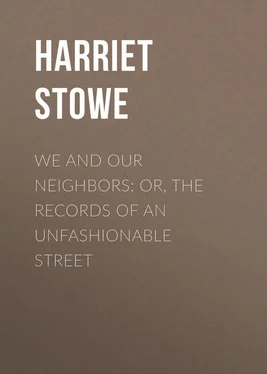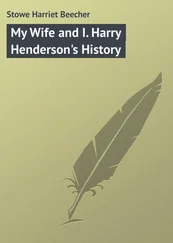Harriet Stowe - We and Our Neighbors - or, The Records of an Unfashionable Street
Здесь есть возможность читать онлайн «Harriet Stowe - We and Our Neighbors - or, The Records of an Unfashionable Street» — ознакомительный отрывок электронной книги совершенно бесплатно, а после прочтения отрывка купить полную версию. В некоторых случаях можно слушать аудио, скачать через торрент в формате fb2 и присутствует краткое содержание. ISBN: , Жанр: foreign_prose, на английском языке. Описание произведения, (предисловие) а так же отзывы посетителей доступны на портале библиотеки ЛибКат.
- Название:We and Our Neighbors: or, The Records of an Unfashionable Street
- Автор:
- Жанр:
- Год:неизвестен
- ISBN:http://www.gutenberg.org/ebooks/48603
- Рейтинг книги:4 / 5. Голосов: 1
-
Избранное:Добавить в избранное
- Отзывы:
-
Ваша оценка:
- 80
- 1
- 2
- 3
- 4
- 5
We and Our Neighbors: or, The Records of an Unfashionable Street: краткое содержание, описание и аннотация
Предлагаем к чтению аннотацию, описание, краткое содержание или предисловие (зависит от того, что написал сам автор книги «We and Our Neighbors: or, The Records of an Unfashionable Street»). Если вы не нашли необходимую информацию о книге — напишите в комментариях, мы постараемся отыскать её.
We and Our Neighbors: or, The Records of an Unfashionable Street — читать онлайн ознакомительный отрывок
Ниже представлен текст книги, разбитый по страницам. Система сохранения места последней прочитанной страницы, позволяет с удобством читать онлайн бесплатно книгу «We and Our Neighbors: or, The Records of an Unfashionable Street», без необходимости каждый раз заново искать на чём Вы остановились. Поставьте закладку, и сможете в любой момент перейти на страницу, на которой закончили чтение.
Интервал:
Закладка:
St. John, like many men of seemingly gentle temperament, had the organizing talent of the schoolmaster. No one could be with him and not feel him; and the intense purpose with which he labored, in season and out of season, carried all before it. He marshaled his forces like an army; his eye was everywhere and on everyone. He trained his choir of singing boys for processional singing; he instructed his teachers, he superintended and catechised his school. In the life of incessant devotion to the church which he led, woman had no place except as an obedient instrument. He valued the young and fair who flocked to his standard, simply and only for what they could do in his work, and apparently had no worldly change with which to carry on commerce of society.
Yet it was true, as Jim said, that his eye had in some way or other been caught by Angelique; yet, at first, it was in the way of doubt and inquiry, rather than approval.
Angelique was gifted by nature with a certain air of piquant vivacity, which gave to her pretty person the effect of a French picture. In heart and character she was a perfect little self-denying saint, infinitely humble in her own opinion, devoted to doing good wherever her hand could find it, and ready at any time to work her pretty fingers to the bone in a good cause. But yet undeniably she had a certain style and air of fashion not a bit like "St. Jerome's love" or any of the mediæval saints. She could not help it. It was not her fault that everything about her had a sort of facility for sliding into trimly fanciful arrangement – that her little hats would sit so jauntily on her pretty head, that her foot and ankle had such a provoking neatness, and that her daintily gloved hands had a hundred little graceful movements in a moment. Then her hair had numberless mutinous little curly-wurlies, and flew of itself into the golden mists of modern fashion; and her almond-shaped hazel eyes had a trick of glancing like a bird's, and she looked always as if a smile might break out at any moment, even on solemn occasions; – all which were traits to inspire doubt in the mind of an earnest young clergyman, in whose study the pictures of holy women were always lean, long-favored, with eyes rolled up, and looking as if they never had heard of a French hat or a pair of gaiter-boots. He watched her the first Sunday that she sat at the head of her class, looking for all the world like a serious-minded canary bird, and wondered whether so evidently airy and worldly a little creature would adapt herself to the earnest work before her; but she did succeed in holding a set of unpromising street-girls in a sort of enchanted state while she chippered to them in various little persuasive intonations, made them say catechism after her, and then told them stories that were not in any prayer-book. After a little observation, he was convinced that she would "do." But the habit of watchfulness continued!
On this day, as Jim had suggested the subject, Alice somehow was moved to remark the frequent direction of Mr. St. John's eyes.
On this Sunday Angelique had had the misfortune to don for the first time a blue suit, with a blue velvet hat that gave a brilliant effect to her golden hair. In front of this hat, nodding with every motion of her head, was a blue and gold humming bird. She wore a cape of ermine, and her class seemed quite dazzled by her appearance. Now Mr. St. John had worked vigorously to get up his little chapel in blue and gold, gorgeous to behold; but a blue and gold teacher was something that there was no churchly precedent for – although if we look into the philosophy of the thing there may be the same sort of influence exercised over street barbarians by a prettily-dressed teacher as by a prettily-dressed church. But as Mr. St. John gazed at Angelique, and wondered whether it was quite the thing for her to look so striking, he saw a little incident that touched his heart. There was a poor, pinched, wan-visaged little girl, the smallest in the class, whose face was deformed by the scar of a fearful burn. She seemed to be in a trembling ecstacy at Angie's finery, and while she was busy with her lesson stealthily laid her thin little hand upon the ermine cape. Immediately she was sharply reproved by a coarse, strong, older sister, who had her in charge, and her hand rudely twitched back.
Angie turned with bright, astonished eyes, and seeing the little creature cowering with shame, beamed down on her a lovely smile, stooped and kissed her.
"You like it, dear?" she said frankly. "Sit up and rest your cheek on it, if you like," and Angie gathered her up to her side and went on telling of the Good Shepherd.
Arthur St. John took the whole meaning of the incident. It carried him back beyond the catacombs to something more authentic, even to Him who said, "Suffer little children to come unto me," and he felt a strange, new throb under his surplice.
The throb alarmed him to the degree that he did not look in that direction again through all the services, though he certainly did remark certain clear, bird-like tones in the chants with a singular feeling of nearness.
Just about this time, St. John, unconsciously to himself, was dealing with forces of which no previous experience of life had given him a conception. He passed out of his vestry and walked to his solitary study in a kind of maze of vague reverie, in which golden hair and hazel eyes seemed strangely blent with moral enthusiasms. "What a lovely spirit!" he thought; and he felt as if he would far rather have followed her out of the door than to have come to the cold, solitary sanctities of his own room.
Mr. St. John's study was not the sanctum of a self-indulgent, petted clergyman, but rather that of one who took life in very serious earnest. His first experience of pastoral life having been among the poor, the sight of the disabilities, wants, and dangers, the actual terrible facts of human existence, had produced the effect on him that they often do on persons of extreme sensibility and conscientiousness. He could not think of retaining for himself an indulgence or a luxury while wants so terrible stared him in the face; and his study, consequently, was furnished in the ascetic rather than the esthetic style. Its only ornaments were devotional pictures of a severe mediæval type and the books of a well-assorted library. There was no carpet; there were no lounging chairs or sofas of ease. In place was a prie dieu of approved antique pattern, on which stood two wax candles and lay his prayer-book. A crucifix of beautiful Italian workmanship stood upon it, and it was scrupulously draped with the appropriate churchly color of the season.
As we have said, this room seemed strangely lonely as he entered it. He was tired with work which had begun early in the morning, with scarce an interval of repose, and a perversely shocking idea presented itself to his mind – how pleasant it would be to be met on returning from his labors by just such a smile as he had seen beaming down on the poor little girl.
When he found himself out, and discovered that this was where his thoughts were running to, he organized a manly resistance; and recited aloud, with unction and emphasis, Moore's exquisite version of St. Jerome's opinion of what the woman should be whom a true priest might love.
"Who is the maid my spirit seeks,
Through cold reproof and slander's blight?
Has she Love's roses on her cheeks?
Is hers an eye of this world's light?
No – wan and sunk with midnight prayer
Are the pale looks of her I love;
Or if at times a light be there,
Its beam is kindled from above.
I choose not her, my heart's elect,
From those who seek their Maker's shrine
In gems and garlands proudly deck'd
As if themselves were things divine.
No – Heaven but faintly warms the breast
That beats beneath a broider'd vail;
And she who comes in glitt'ring vest
To mourn her frailty, still is frail.
Интервал:
Закладка:
Похожие книги на «We and Our Neighbors: or, The Records of an Unfashionable Street»
Представляем Вашему вниманию похожие книги на «We and Our Neighbors: or, The Records of an Unfashionable Street» списком для выбора. Мы отобрали схожую по названию и смыслу литературу в надежде предоставить читателям больше вариантов отыскать новые, интересные, ещё непрочитанные произведения.
Обсуждение, отзывы о книге «We and Our Neighbors: or, The Records of an Unfashionable Street» и просто собственные мнения читателей. Оставьте ваши комментарии, напишите, что Вы думаете о произведении, его смысле или главных героях. Укажите что конкретно понравилось, а что нет, и почему Вы так считаете.












